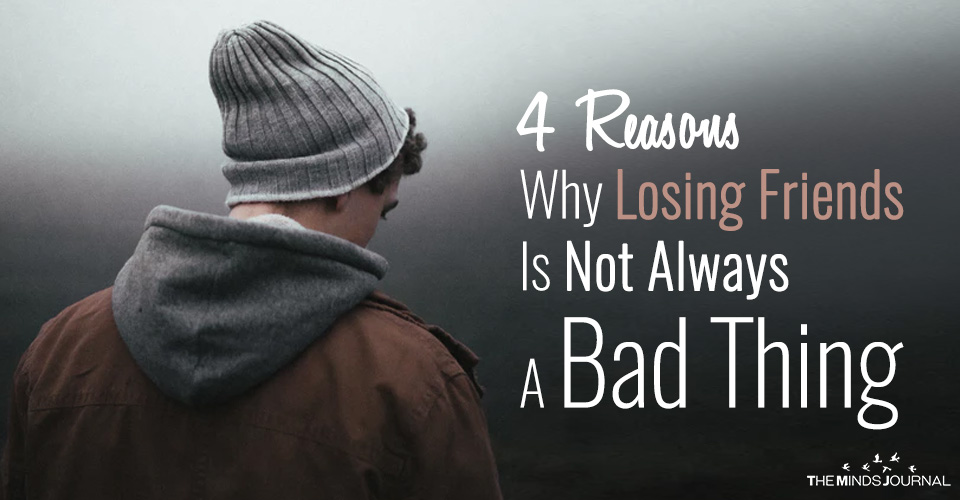If you are losing friends know that your life is teaching you lessons.
In our lives we come across turns where we questions ourselves as to why we are losing friends. Similarly there are times when we meet a stranger and we connect to him/her so well that we believe we have got a person for our lifetime.
Friendship is the purest form of bond. If it lasts long it is an experience of a kind. But everything is changing around us with the fleeting time and change is the only constant. Not withstanding this, we often times face separation from the people we least except.
You will notice that friendships keep changing over the years-even the person who was supposedly your best friend the previous year might not even be in the inner circle now. It is a very frequent happening pertaining to the fact that we human beings are active on different social levels.
We connect with various people, across different circumstances. Certain situations demand us to interact with new people to encourage communication. This is how we end up making friends in varied spheres. It is safe to say that whether you have intentionally ended a friendship or have drifted away from a friend over time – you have lost friends. We all do.
Everyone comes to your life with a purpose
Losing a friend is indeed not much different than breaking up with someone romantically. Both the incidents will equally devastate you. Break up from a romantic involvement is more talked about whereas a break from friendship is not paid much attention. The emotional experience in both the cases is equally painful.
Sometimes, friendships end because circumstances change.
Most often than not, the people you lose will teach you some significant lessons before they disappear forever. Some of the lessons you learn will shatter you while most will transform you.
Trust me, you will be thankful to them for leaving you with wisdom.
Here’s why we lose friends as we get older.
Here are 4 reasons why losing friends is not always bad:
1. Understand the Climate of the Friendship
In life we pass through various circumstances where we come in contact with new people from various fields. It is a part and parcel of our lives.
Be it through work, school, gym, though random social gatherings , we are constantly connecting to people – some for our mutual benefits, some for our professional causes and some to our personal extent.
What mostly people overlook is an inevitable fact – the “climate of friendship” changes along with time. It is destined to happen, irrespective of how much you detest it. We disconnect with some people during this “change” and recreate connection with some other later on.
2. People Lose Their Compatibility
It is not always because of change in set up that we lose friends but also because with time we prioritize other aspects of our lives over our friendship with certain people.
Initially as two people connect, they go through a plethora of cheerful memories. They share moments. they share their personal histories and they become a significant part of each other’s life.
Inevitably with time, the bond with certain people fade due to a lot of reasons. On both ends, the focus might change, their current choices maybe different, the person’s ideals, values and goals might have evolved.
People seek change because that is how one dynamic individual looks forward to transformation.
Losing old friends and forming new connections are a part of dynamic evolution that every single individual goes through. It might seem to be a negative experience but in actuality it helps broaden our perspective and the horizon of our knowledge.
3. People Grow Differently
Not to mention, when two people share a positively flourishing relationship, their lives are entangled to each other in various ways. But every person has a unique life experience.
At some point or the other, even the closest of people, consider sisters and brothers, grow apart. At definite circumstances, their ideals and values might be contradictory to your’s. These opposing ideas might lead to fall outs.
You might have friends who are making your friendship difficult to sustain by taking bad life decisions or involving in activities you don’t want to be personally involved in. However close your friend might be to you, their certain actions can spoil your image and reputation.
If breaking bonds with these buddies seem impossible, it’s good to consider temporary detachment from them.
Talk out with them about what is bothering you. If they are still inconsiderate of your feelings, you should give them the space to realize your worth.
One’s circle should be small as quality matters over quantity.
4. Friendship often gets toxic
If you find yourself feeling disgruntled and unhappy with a friend’s behavior more often than not, you may be in a toxic friendship.
Sometimes your friendship with someone might feel like you are walking on eggshells. With such people around you, you always have to review everything you say, every single way you behave and react. If you are constantly under the fear of ‘your shared secrets’ being exposed you will lose your mental peace.
The biggest foundation of any connection is trust. If your friendship with someone cannot render you the environment to trust each other, it is not worth your time or efforts.
Reciprocity is one of the significant elements of friendship and if this lacks in your friendship, you can, well, consider it a big red flag. It is better not to pursue such a friend.
What life lessons have you learned from friends who have come and gone?
Here Are Some 8 Types Of Toxic People You Should Leave Without Feeling Guilty.










Leave a Reply